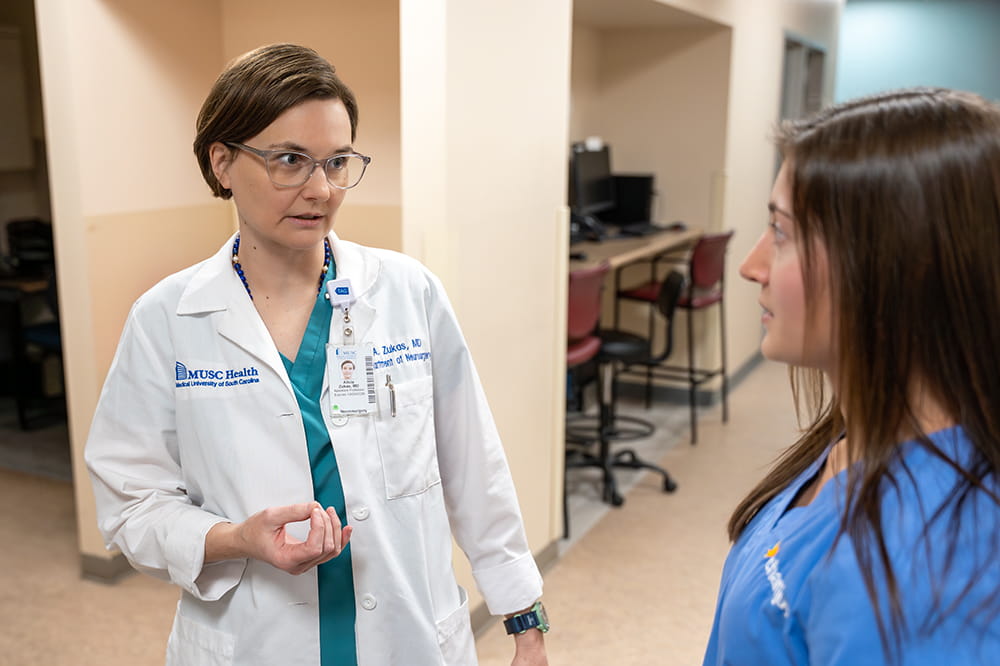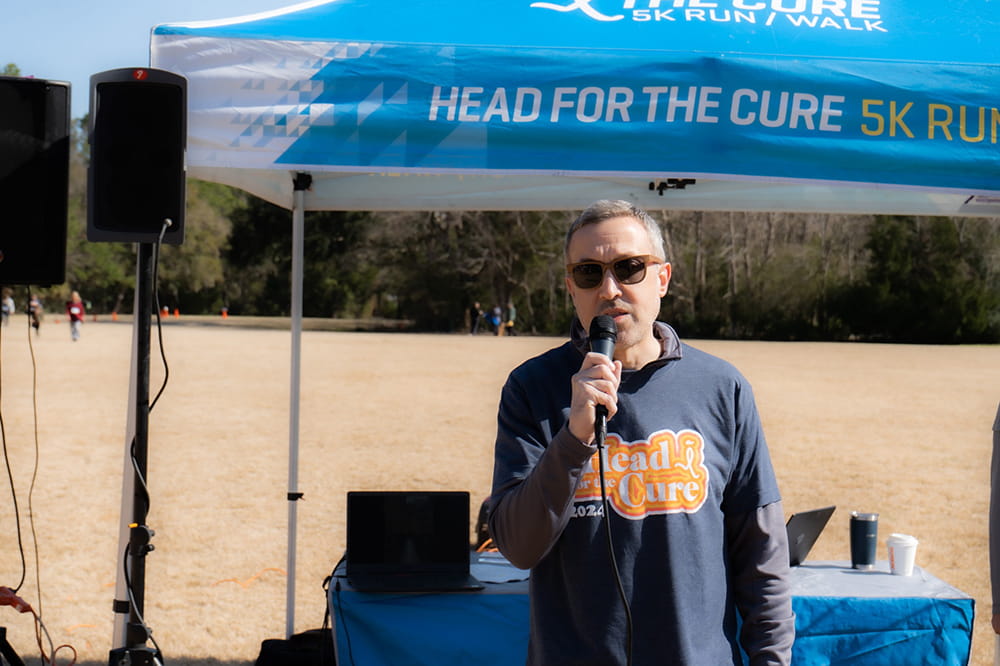After more than 10 years at MUSC Hollings Cancer Center treating people with brain tumors, Scott Lindhorst, M.D., has rarely felt burned out.
Part of that is because of the intellectual aspect of his job – working on clinical trials, reading other researchers' work and figuring out the best approach for a patient with one of the more than 150 different types of brain tumors.
"I feel that oncology is the most rapidly evolving and exciting field in all of medicine," he said. "If you look at many issues of the New England Journal of Medicine, half of it is oncology, and that's because that's where all the advancements are happening."
The other part, though, is the patients and their families.
"You feel like you're making a difference," he said. "Definitely, you have the ability to improve disease processes for a lot of people – not as many as we'd like, depending on the diagnosis – but in just about everybody, you can improve their day-to-day quality of life."
Alicia Zukas, M.D., agreed. Some might assume that working with brain tumor patients means unending sad days, but that's not the case, Zukas and Lindhorst said.
"They're going to have brain cancer anyway, whether I exist or not," Zukas said. "If I can go home at the end of the day and feel like I had a positive impact on someone with a devastating process, that makes the day worthwhile."
Neuro-oncology in South Carolina
Zukas and Lindhorst are the only neuro-oncologists in South Carolina – in other words, the only doctors certified by the United Council for Neurologic Subspecialties to specialize in treating brain tumors with medicine.
They work with a team that includes neurosurgeons, radiation oncologists, pharmacists, physical therapists, a speech language therapist and psychologists who have expertise in working with people with brain tumors.
Because other types of cancers can metastasize, or spread, to the brain, they also work closely with the breast cancer, lung cancer and melanoma teams.

Getting care at a place like Hollings – the only National Cancer Institute-designated cancer center in South Carolina and a part of the only comprehensive academic health system in the state – means that patients have access to a multidisciplinary team that actively seeks out the most promising clinical trials, even for rare tumors.
"We're always looking to expand our trial repertoire. For a lot of our patient population, that's the Holy Grail," Lindhorst said. "That's what we need to offer them, that they're not going to get in most community centers, and that's how we move the field forward."
Advancing the science
Clinical trials show whether a treatment works. They're often also a chance for patients to try a new therapy before it's widely available. For example, Hollings participated in INDIGO, a clinical trial of a targeted therapy for people with grade 2 gliomas and a mutation in the IDH gene.
The current standard therapy for this tumor includes radiation and chemotherapy, both of which come with side effects that can be felt for years to come, particularly because patients with these tumors tend to be younger adults.
"We try to balance quality of life with extension of life," Lindhorst explained. "The hope is that by having a targeted intervention like that, that's much more tolerable, we can avoid other things like radiation and traditional chemotherapy for many, many years and help them live normal lives not thinking about their brain tumor every day."
The results of that trial were written up in The New England Journal of Medicine last August, and Lindhorst expects to see the therapy approved by the U.S. Food and Drug Administration within a year or so.
That's just one example of a clinical trial that brought a new therapy to patients. Hollings is actively involved in multiple clinical trial networks. For the neuro-oncology team, the most significant is probably the Brain Tumors Trials Collaborative (BTTC), a group of 33 institutions across the nation that work together to develop and conduct clinical trials.
"Of the 150 different brain tumors, all of them require different approaches and treatments. Many of them are rare; like a lot of orphan diseases, they don't get a lot of attention. One of the advantages of participating in the BTTC and of being seen at a tertiary care center like MUSC is gaining access to people thinking about those rare tumors and how we as a medical community might better approach those," Lindhorst said.

Zukas noted that, after a long period of few advancements, neuro-oncology is now starting to gain momentum.
"Compared to the rest of oncology, which is rapidly advancing, we're still way behind, but it's really cool that we've gotten one or two new therapies every year recently," she said. "That's a good beginning."
Some of those advancements include chemotherapy and radiation therapy implanted directly into the brain, allowing for doses to penetrate only the area nearest to the tumor's location; new drugs, including one for people with von Hippel-Lindau syndrome, an inherited condition that can cause both benign and cancerous tumors; and a device that uses electrical fields to slow the growth of tumors.
Lindhorst said there are a couple of factors behind the progress that is somewhat slower than other cancer types to date.
"Neuro-oncology is the smallest of all medical oncology subspecialties and so there are, by absolute numbers, less people and less patients; this makes the journey of bringing a clinical trial to completion longer," he said. "At the tough end of the spectrum are diagnoses like glioblastoma. It's just a very tough cancer – among the toughest of the tough – so newer therapies are more difficult to prove."
Nonetheless, he's intrigued by what may happen next in neuro-oncology, particularly when it comes to developing more targeted therapies and using immunotherapy, which has been a game-changer in other cancer types.
Zukas said she's interested in improving diagnostics and identifying biomarkers of disease.
"I want to know how to diagnose someone earlier or less invasively," she said.
When all is said and done, the two emphasize that it's the patients who bring them back to work each day.
"For a malignant process, I've not encountered a malignant person," Zukas said. "All of my coworkers have been super nice throughout, and the families are nice."
Lindhorst agreed.
"During a long day of seeing patients in clinic, you walk in and out of a lot of doors," he said. "Every door does not contain a patient with an extremely difficult diagnosis with no options. Most patients are not in this category. Behind most of the doors lies a mission to ensure you're making some progress in the patient's journey – that you're making an impact on their day-to-day quality of life and that things are better than they were the day before in some way. And there's a lot of good to take from that."






